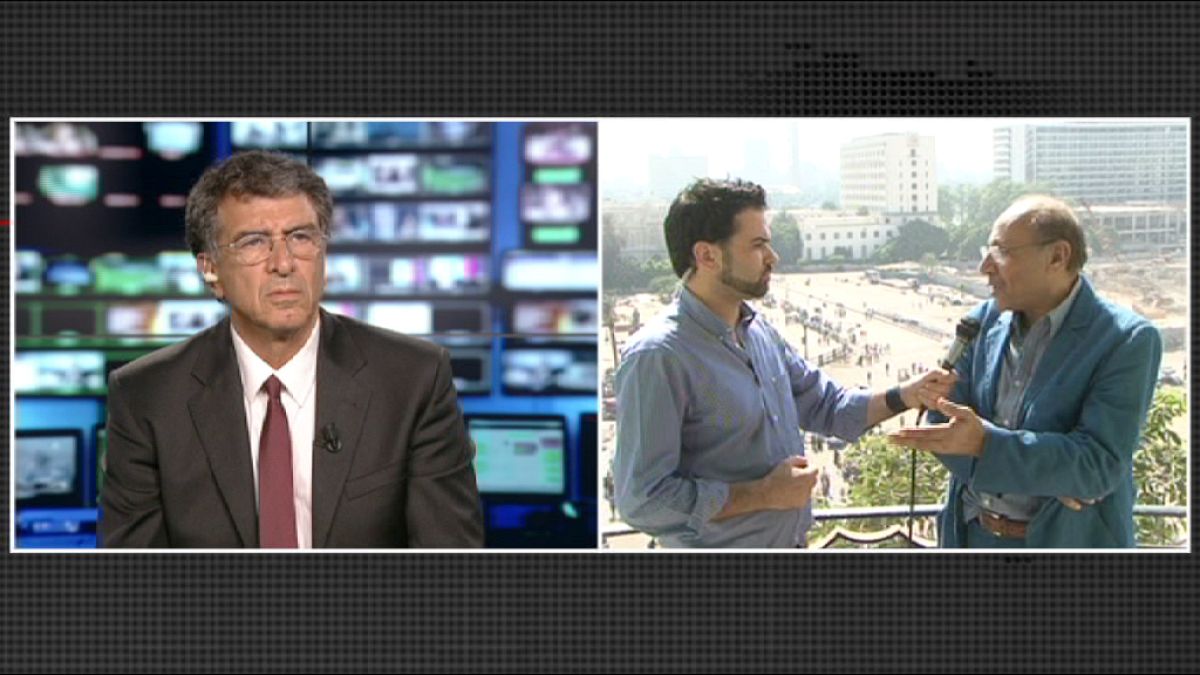Riad Muasses, euronews: “Following closely the bloodshed surrounding events in Egypt, and the army’s intervention in politics with the divestment of Mohamed Mursi as president, we speak with our Cairo correspondent Mohammed Shaikhibrahim. Mohammed, what’s the atmosphere like after Mursi’s removal?”
Mohammed Shaikhibrahim, euronews: “The Egyptian people have welcomed enthusiastically the decision of the Military Council to pass the presidency over temporarily to the head of the Constitutional Court yesterday evening. It’s a joyful atmosphere here in the streets of Cairo, and in every city in Egypt, after what people here are calling ‘the corrective revolution.’”
Muasses: “Major international actors are asking for a return of democracy to Egypt. Can that happen?”
Shaikhibrahim: “The Military Council has reassured the people that it’s not going to take power in Egypt, that it doesn’t have those sorts of ambitions. The Council said it only wants to avoid bloodbaths and to calm things down. The President of the Constitutional Court was sworn in as interim head of state, hoping he can form a government in the shortest possible time.”
Muasses: “If there are early elections in Egypt, is there any chance that the Muslim Brotherhood could return to power?”
Shaikhibrahim: “The Muslim Brotherhood say they are going to stay on the political scene. We can tell that after visiting them at the Rabia Adawia mosque yesterday. They say they’ll stay till the end and they consider the Military Council’s decision invalid.”
Muasses: “Yes, but if there are anticipated elections, could the Muslim Brotherhood win at the ballot box?”
Shaikhibrahim: “I’m going to ask that question of our interview guest, political analyst Saad Hajras, after we take a look at [a report on the dynamic of the Muslim Brotherhood in relation to the army].”
It probably never entered Mohamed Mursi’s head a year ago when he became president that it would be so short, that the army would feel he broke contract and pitch him out – the first elected civilian head of the Arab world’s most populous state.
All those before him – since the 1952 revolution, an army putsch – were military men. Mursi was the representative of the country’s only other structured force of any kind: the radical Islamist Muslim Brotherhood – apart from the army and if force is the word for it. The brothers were outmatched and outlawed, so a lot of them saw the insides of prison.
The anti-Mubarak protests had no Muslim Brothers in them at first, even though he had always kept them out of politics; they only joined in later. This had them on the same side as the army, more or less; right from the start of the 2011 Arab Spring uprising, the army had said it was on the side of the people.
The army has privileges in Egypt, and those who had them weren’t about to let them go if they could help it. The army helped to push Mubarak out, with his government, and watched over the following transition. But that stretched out. The Islamists won the legislative elections in December 2011. Then people got fed up of the army in the driver’s seat, and demanded polls for a civilian president.
Six months later Mursi was in. He felt on top for the first while. He sent Field Marshall Tantaoi into retirement – who had been army chief for 20 years. Mursi put General Sisi in his place. But he didn’t touch army privileges – subsidies for housing, services and goods, business holdings and good pensions.
When Mursi failed to produce results politically, socially and economically, the army threw up protective barricades around the presidential palace. It also began polishing its credentials as ultimate guarantor of the whole nation’s security.
The secular military is the most powerful institution in Egypt. General Sisi said it is not interested in being in politics. But it does oppose direct threats to the state, such as the growing dysfunctionality under the Islamists and Mursi.
Mohammed Shaikhibrahim: “Joining us now is Saad Hajras who is a political analyst. How do you see the situation now in Egypt?”
Saad Hajras: “This is a very big revolution in every dimension, in size and in scope. I don’t think that the whole of humanity has seen a demonstration like this before. Thirty-three-million Egyptian people were on the streets across the country, calling for freedom. Secondly, the demands of this revolution were clear, compared to the January 25 Revolution. That only asked for one thing, the removal of Mubarak.
“But now, they are asking Mursi to leave and making other demands. These demands are the same ones made by General Sisi the armed forces chief during his statement, and I think this is a new phase in Egyptian politics that puts the country on a new path. This path will lead us towards becoming a modern democratic state.”
euronews: “What do you think the political future for the Muslim Brotherhood is in Egypt?”
Hajras: “The Muslim Brotherhood has not been excluded from politics in Egypt. The party is faced with an historical choice. Either they interpret this event in the right way or they’ll continue to see this as a military coup, and this is not true – you only have to look at the TV pictures shown around the world, and you can see the millions who’ve been on the streets. All of this has nothing to do with a military coup.”
euronews: “But now several Muslim Brotherhood leaders are in jail, and this will affect their political future.”
Saad Hajras: “These incarcerations are not politically motivated, they are criminally based. You know that lots of people have been killed in front of Cairo University and other places in Egypt. But General al-Sisi’s statement made clear that no political parties will be excluded, even the Muslim Brotherhood.”
